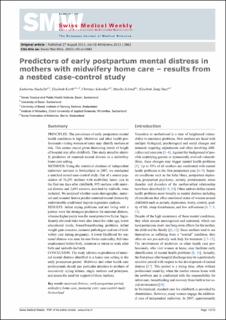Please use this identifier to cite or link to this item:
https://doi.org/10.21256/zhaw-4925Full metadata record
| DC Field | Value | Language |
|---|---|---|
| dc.contributor.author | Staehelin, Katharina | - |
| dc.contributor.author | Kurth, Elisabeth | - |
| dc.contributor.author | Schindler, Christian | - |
| dc.contributor.author | Schmid, Monika | - |
| dc.contributor.author | Zemp Stutz, Elisabeth | - |
| dc.date.accessioned | 2018-12-05T15:33:10Z | - |
| dc.date.available | 2018-12-05T15:33:10Z | - |
| dc.date.issued | 2013 | - |
| dc.identifier.issn | 1424-7860 | de_CH |
| dc.identifier.issn | 1424-3997 | de_CH |
| dc.identifier.issn | 0036-7672 | de_CH |
| dc.identifier.uri | https://digitalcollection.zhaw.ch/handle/11475/13596 | - |
| dc.description.abstract | Principles: The prevalence of early postpartum mental health conditions is high. Midwives and other health professionals visiting women at home may identify mothers at risk. This seems crucial given decreasing trends of length of hospital stay after childbirth. This study aimed to identify predictors of maternal mental distress in a midwifery home care setting. Methods: Using the statistical database of independent midwives' services in Switzerland in 2007, we conducted a matched nested case-control study. Out of a source population of 34,295 mothers with midwifery home care in the first ten days after childbirth, 935 mothers with maternal distress and 3,645 controls, matched by midwife, were included. We analysed whether socio-demographic, maternal and neonatal factors predict maternal mental distress by multivariable conditional logistic regression analysis. Results: Infant crying problems and not living with a partner were the strongest predictors for maternal distress, whereas higher parity was the most protective factor. Significantly elevated risks were also found for older age, lower educational levels, breast/breastfeeding problems, infant weight gain concerns, neonatal pathologies and use of midwifery care during pregnancy. A lower likelihood for maternal distress was seen for non-Swiss nationality, full-time employment before birth, intention to return to work after birth and midwife-led birth. Conclusion: The study informs on predictors of maternal mental distress identified in a home care setting in the early postpartum period. Midwives and other health care professionals should pay particular attention to mothers of excessively crying infants, single mothers and primipara, and assess the need for support of these mothers. | de_CH |
| dc.language.iso | en | de_CH |
| dc.publisher | EMH Schweizerischer Ärzteverlag | de_CH |
| dc.relation.ispartof | Swiss Medical Weekly | de_CH |
| dc.rights | https://creativecommons.org/licenses/by-nc-nd/4.0/ | de_CH |
| dc.subject | Risk factors | de_CH |
| dc.subject | Switzerland | de_CH |
| dc.subject | Home care services | de_CH |
| dc.subject | Midwifery | de_CH |
| dc.subject | Postnatal care | de_CH |
| dc.subject.ddc | 618: Geburtsmedizin und Hebammenarbeit | de_CH |
| dc.title | Predictors of early postpartum mental distress in mothers with midwifery home care : results from a nested case-control study | de_CH |
| dc.type | Beitrag in wissenschaftlicher Zeitschrift | de_CH |
| dcterms.type | Text | de_CH |
| zhaw.departement | Gesundheit | de_CH |
| zhaw.organisationalunit | Institut für Hebammenwissenschaft und reproduktive Gesundheit (IHG) | de_CH |
| dc.identifier.doi | 10.21256/zhaw-4925 | - |
| dc.identifier.doi | 10.4414/smw.2013.13862 | de_CH |
| dc.identifier.pmid | 23986402 | de_CH |
| zhaw.funding.eu | No | de_CH |
| zhaw.issue | w13862 | de_CH |
| zhaw.originated.zhaw | Yes | de_CH |
| zhaw.publication.status | publishedVersion | de_CH |
| zhaw.volume | 143 | de_CH |
| zhaw.publication.review | Peer review (Publikation) | de_CH |
| Appears in collections: | Publikationen Gesundheit | |
Files in This Item:
| File | Description | Size | Format | |
|---|---|---|---|---|
| 2013_Staehelin_Predictors_of_realy_postpartum_mental_distress.pdf | 653.7 kB | Adobe PDF |  View/Open |
Show simple item record
Staehelin, K., Kurth, E., Schindler, C., Schmid, M., & Zemp Stutz, E. (2013). Predictors of early postpartum mental distress in mothers with midwifery home care : results from a nested case-control study. Swiss Medical Weekly, 143(w13862). https://doi.org/10.21256/zhaw-4925
Staehelin, K. et al. (2013) ‘Predictors of early postpartum mental distress in mothers with midwifery home care : results from a nested case-control study’, Swiss Medical Weekly, 143(w13862). Available at: https://doi.org/10.21256/zhaw-4925.
K. Staehelin, E. Kurth, C. Schindler, M. Schmid, and E. Zemp Stutz, “Predictors of early postpartum mental distress in mothers with midwifery home care : results from a nested case-control study,” Swiss Medical Weekly, vol. 143, no. w13862, 2013, doi: 10.21256/zhaw-4925.
STAEHELIN, Katharina, Elisabeth KURTH, Christian SCHINDLER, Monika SCHMID und Elisabeth ZEMP STUTZ, 2013. Predictors of early postpartum mental distress in mothers with midwifery home care : results from a nested case-control study. Swiss Medical Weekly. 2013. Bd. 143, Nr. w13862. DOI 10.21256/zhaw-4925
Staehelin, Katharina, Elisabeth Kurth, Christian Schindler, Monika Schmid, and Elisabeth Zemp Stutz. 2013. “Predictors of Early Postpartum Mental Distress in Mothers with Midwifery Home Care : Results from a Nested Case-Control Study.” Swiss Medical Weekly 143 (w13862). https://doi.org/10.21256/zhaw-4925.
Staehelin, Katharina, et al. “Predictors of Early Postpartum Mental Distress in Mothers with Midwifery Home Care : Results from a Nested Case-Control Study.” Swiss Medical Weekly, vol. 143, no. w13862, 2013, https://doi.org/10.21256/zhaw-4925.
Items in DSpace are protected by copyright, with all rights reserved, unless otherwise indicated.